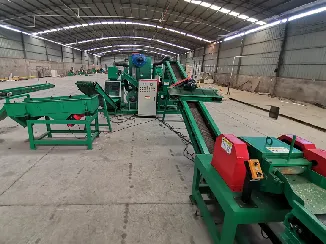

Jul . 27, 2024 16:10 Back to list
The Importance of Ferrous Shredders in Metal Recycling
In recent years, the recycling industry has gained immense significance due to the growing awareness of environmental conservation, resource management, and sustainability. One of the key players in the metal recycling sector is the ferrous shredder. These machines play a crucial role in breaking down ferrous metals, primarily iron and steel, into smaller, manageable pieces. The process not only facilitates easier handling and transportation but also enhances the efficiency of recycling operations.
What is a Ferrous Shredder?
A ferrous shredder is a powerful industrial machine designed to reduce large ferrous metal scrap into smaller fragments. This is accomplished using heavy-duty cutting tools that operate at high speeds, shredding the metal into pieces that are typically one to six inches in size. The process relies on the use of high torque and robust rotor designs, allowing the machine to handle various types of scrap, including automobiles, appliances, and construction debris.
Advantages of Recycling Ferrous Metals
The recycling of ferrous metals has significant environmental and economic benefits. Firstly, it reduces the need for virgin materials, which often require extensive mining and extraction processes that deplete natural resources and disrupt ecosystems. By recycling ferrous metals, we minimize the carbon footprint associated with these activities, conservatively using energy and water while significantly lowering greenhouse gas emissions.
Moreover, recycling ferrous metals saves energy. The process of recycling steel reduces energy consumption by up to 70% compared to producing it from raw iron ore. This not only contributes to energy conservation but also translates into lower costs for manufacturers, which can pass these savings onto consumers.
The Role of Ferrous Shredders

Ferrous shredders are integral to the metal recycling process. They enable scrap yards and recycling centers to quickly and efficiently process large volumes of metal waste. By breaking down scrap materials into smaller, uniform pieces, ferrous shredders make it easier to separate various types of metals. This step is crucial for the efficient operation of downstream processes, such as magnetic separation, where ferrous metals are removed from non-ferrous materials for individual processing.
Additionally, the shredding process enhances the quality of the final recycled material. Smaller metal pieces allow for better melting and refining, ensuring that the recycled product meets industry standards. This, in turn, increases the market value of recycled ferrous metals and supports a robust recycling economy.
Technological Advancements
The technology surrounding ferrous shredders has evolved significantly over the years. Modern machines are equipped with advanced features such as automated controls, improved safety systems, and energy-efficient designs. Innovations like hydraulic assist for easier loading and maintenance-friendly designs increase the operational efficiency of shredders, allowing recyclers to process materials faster while minimizing downtime.
Furthermore, the integration of data analytics and monitoring systems enables operators to optimize performance and predict maintenance needs, enhancing the overall productivity of ferrous shredding operations. As the demand for recycled metals continues to increase, the industry is likely to see further advancements in shredding technology.
Conclusion
In conclusion, ferrous shredders are vital components of the metal recycling industry, enabling effective processing and recycling of ferrous metals. Their ability to reduce large volumes of scrap into manageable pieces promotes sustainability by conserving natural resources and reducing energy consumption. As technological innovations continue to improve efficiency and safety, ferrous shredders will undoubtedly play an increasingly central role in our efforts to create a more sustainable future. Investing in effective shredding technology not only benefits businesses in the recycling sector but also contributes to environmental health and resource conservation on a broader scale.
Latest news
Troubleshooting Common Eddy Separator Problems
NewsJul.04,2025
The Role of Metal Recycling Plants in Circular Economy
NewsJul.04,2025
The Impact of Recycling Line Pickers on Waste Management Costs
NewsJul.04,2025
Safety Features Every Metal Shredder Should Have
NewsJul.04,2025
How Industrial Shredders Improve Waste Management Systems
NewsJul.04,2025
How Cable Granulators Contribute to Sustainable Recycling
NewsJul.04,2025